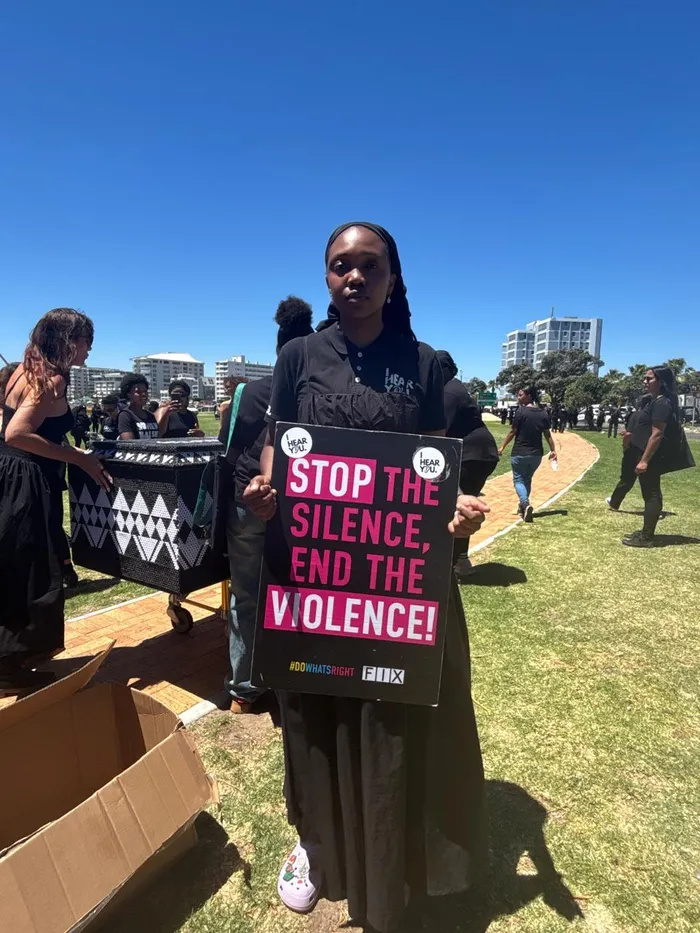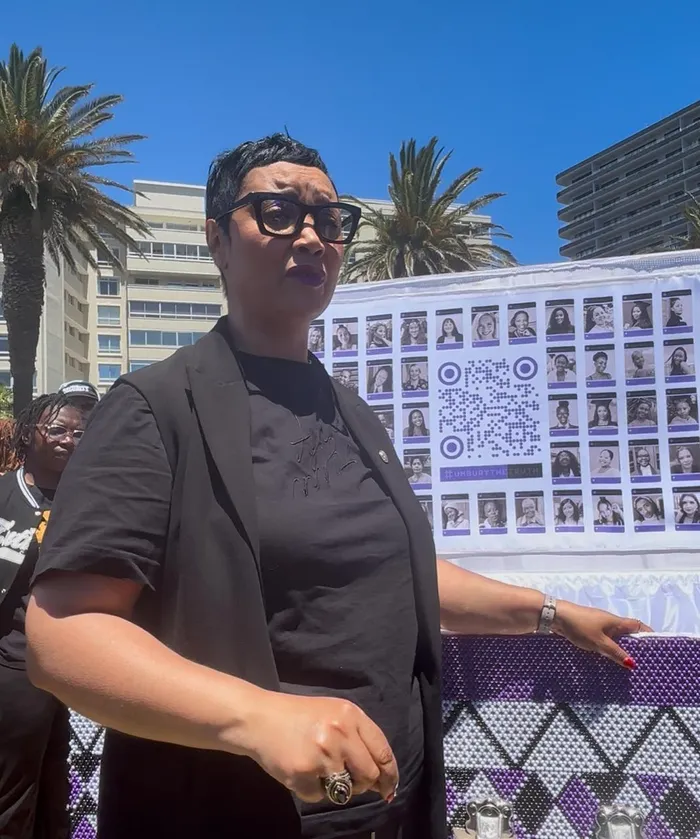Cape Town unites against GBV

Merlize Jogiat, advocacy and operations manager at Women for Change
Image: TARA ISAACS

UWC students Stcino Mngandi and Ntsika Mikizolo are calling for an end to violence.
Image: TARA ISAACS

A hearse carrying a symbolic coffin leads the public into mourning for women and children lost to gender-based violence
Image: TARA ISAACS

Paballo Mbedzi, founder of 'I Hear You' non-profit orgaanisation
Image: TARA ISAACS

Tamsyn Appollis, Laetitia Kalunga, Honey Heuval, and Huda Davistein held up their placards with pride
Image: TARA ISAACS
Hundreds of people from all over the city gathered at the Sea Point Promenade on Friday, November 21, in support of the G20 Women's Shutdown, bringing the suburb to a standstill in a call for action against gender-based violence and femicide (GBVF).
The gathering formed part of a nationwide protest spearheaded by Women for Change, a non-profit organisation.
At noon, protesters lay down on the open spaces in silence to honour victims of GBVF and to underscore the demand for meaningful government intervention, while the names of known victims were read out loud.
Dressed predominantly in black, community members lined the streets and gathered around a symbolic open coffin representing the women and children killed in acts of violence.

An aerial view of protesters on the promenade for the G20 Women’s Shutdown on Friday.
Image: Armand Hough / Independent Newspapers
What resembled a funeral procession moved through the area, with mourners singing struggle songs and holding placards, demanding an end to the violence.
According to national crime statistics, 15 women are killed every day in South Africa, and more than 115 rape cases are reported daily.
Merlize Jogiat, advocacy and operations manager at Women for Change, said the Sea Point protest served not only as a demonstration but also as a memorial.
“Femicide rates in South Africa remain shockingly high. We feel that the government and the justice system do not give gender-based violence the urgent attention it deserves. Today we lie down in memory of the women and children we have lost,” she said.
Residents stood alongside human-rights activist Paballo Mbedzi, founder of 'I Hear You' non-profit, who wept beside the coffin.
Survivors from the community and surrounding areas also came forward.
Gender-based violence survivor, Kuselwa Kafu, said: “I am one of the many women in South Africa who have experienced gender-based violence. I stand with my sisters today calling on men to respect themselves and put an end to this violence.”
Another woman, who attended wearing a black veil to protect her identity, grew emotional as she recalled being told by an advocate that she was “too old to be raped.”
“My alleged attacker is free. I am the one carrying the hurt,” she said as she started sobbing.
ActionSA activist Dereleen James, who wiped her tears as she viewed photographs of murdered women and children displayed in the coffin, said she would continue fighting for justice.
“I will keep speaking for those who can no longer speak for themselves,” she said.
As the coffin was placed into a hearse, people followed behind in a solemn procession.
Minister of Cooperative Governance and Traditional Affairs, Velenkosini Hlabisa, confirmed on Friday that the National Disaster Management Centre had finalised the classification of GBVF as a disaster following increasing concern over the widespread abuse of women and children.

Hundreds gathered around the symbolic coffin to mourn the loss of GBV victims
Image: TARA ISAACS

ActionSA activist Dereleen James became emotional as she looked at the pictures of those who lost their lived to gender-based violence
Image: TARA ISAACS

Dressed predominantly in black, community members lined the streets and gathered around a symbolic open coffin representing the women and children killed in acts of violence. They danced and sang struggle songs in rememberance of those lost to GBV
Image: TARA ISAACS

Turki Shafloot of Sea Point joined in on the march
Image: TARA ISAACS

An attendee wearing a black veil to protect her identity, grew emotional as she recalled being told by an advocate that she was “too old to be raped.”
Image: TARA ISAACS